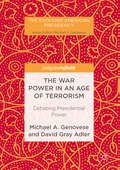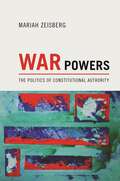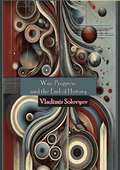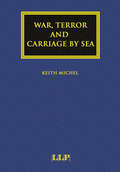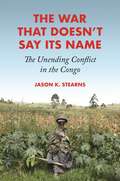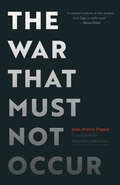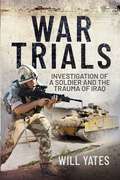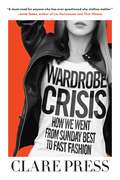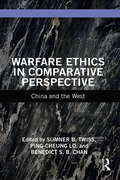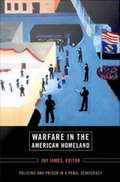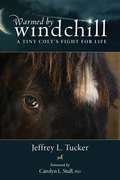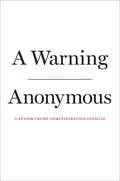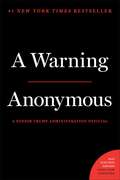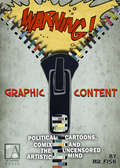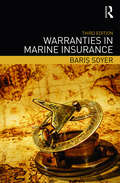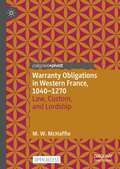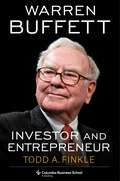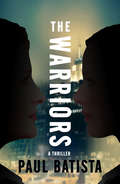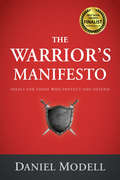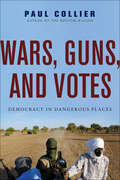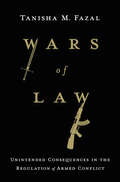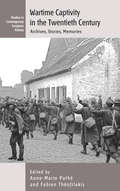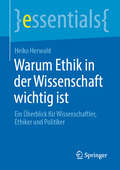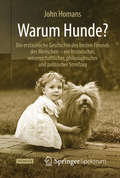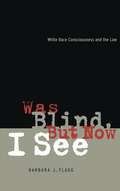- Table View
- List View
The War Power in an Age of Terrorism
by Michael A. Genovese David Gray AdlerThis book features a lively debate between two prominent scholars--Michael A. Genovese and David Gray Adler--on the critical issue of whether the Constitution, written in the 18th Century, remains adequate to the national security challenges of our time. The question of the scope of the president's constitutional authority--if any--to initiate war on behalf of the American people, long the subject of heated debate in the corridors of power and the groves of academe, has become an issue of surpassing importance for a nation confronted by existential threats in an Age of Terrorism. This question should be thoroughly reviewed and debated by members of Congress, and considered by all Americans before they are asked to go to war. If the constitutional allocation of powers on matters of war and peace is outdated, what changes should be made? Is there a need to increase presidential power? What role should Congress play in the war on terror?
War Powers: The Politics of Constitutional Authority
by Mariah ZeisbergArmed interventions in Libya, Haiti, Iraq, Vietnam, and Korea challenged the US president and Congress with a core question of constitutional interpretation: does the president, or Congress, have constitutional authority to take the country to war? War Powers argues that the Constitution doesn't offer a single legal answer to that question. But its structure and values indicate a vision of a well-functioning constitutional politics, one that enables the branches of government themselves to generate good answers to this question for the circumstances of their own times. Mariah Zeisberg shows that what matters is not that the branches enact the same constitutional settlement for all conditions, but instead how well they bring their distinctive governing capacities to bear on their interpretive work in context. Because the branches legitimately approach constitutional questions in different ways, interpretive conflicts between them can sometimes indicate a successful rather than deficient interpretive politics. Zeisberg argues for a set of distinctive constitutional standards for evaluating the branches and their relationship to one another, and she demonstrates how observers and officials can use those standards to evaluate the branches' constitutional politics. With cases ranging from the Mexican War and World War II to the Cold War, Cuban Missile Crisis, and Iran-Contra scandal, War Powers reinterprets central controversies of war powers scholarship and advances a new way of evaluating the constitutional behavior of officials outside of the judiciary.
War, Progress, and the End of History
by Vladimir Sergeyevich SolovyovWar, Progress, and the End of History by Vladimir Sergeyevich Solovyov is a profound philosophical work that explores the moral, spiritual, and political dimensions of human history, offering a compelling reflection on war, progress, and humanity’s ultimate destiny. Written by one of Russia’s most influential philosophers, Solovyov’s work combines theology, ethics, and social criticism, raising questions about the meaning of history and the future of civilization.Solovyov critically examines the idea of progress, questioning whether material and technological advancements alone lead to true human flourishing. He warns that unchecked progress, detached from moral and spiritual values, risks leading humanity toward greater conflict and destruction. His reflections on war are particularly striking, as he views it not just as a political phenomenon but as a manifestation of deeper ethical and spiritual crises within human society.At the heart of the book is Solovyov’s belief in the need for moral renewal and the integration of divine truth into human affairs. He argues that history will culminate not in endless progress but in an eschatological fulfillment—a moment when divine justice and harmony are realized at the end of history. Through this vision, Solovyov offers both a critique of modern society and a hopeful outlook for the future, emphasizing the role of love, unity, and spiritual transformation in shaping a better world.War, Progress, and the End of History remains a thought-provoking work for readers interested in philosophy, theology, and political theory. Solovyov’s ideas continue to resonate in contemporary discussions on the limits of progress, the nature of conflict, and the moral direction of humanity. His blend of intellectual rigor and spiritual insight offers a timeless perspective on humanity’s struggles and aspirations in the pursuit of a just and meaningful future.
War, Terror and Carriage by Sea (Maritime and Transport Law Library)
by Keith MichelWar, Terror and Carriage by Sea provides a comprehensive legal analysis of the law and practice relating to the impact of war or war related risks, terrorism and piracy on international commercial shipping. It includes a detailed review of: • International Hull Clauses, the Institute War and Strikes Clauses, and by the P&I Associations and War Risk Associations in respect of war, war related, terrorist and associated risks • The impact of the threat oroccurrence of such risks on international carriage by sea including a review of the principal time and voyagecharter forms • A detailed review of the December 2002 amendments to the SOLAS 1974 Convention and the regulations and provisions contained in the ISPS Code
The War That Doesn't Say Its Name: The Unending Conflict in the Congo
by Jason K. StearnsWhy violence in the Congo has continued despite decades of international intervention Well into its third decade, the military conflict in the Democratic Republic of the Congo has been dubbed a “forever war”—a perpetual cycle of war, civil unrest, and local feuds over power and identity. Millions have died in one of the worst humanitarian calamities of our time. The War That Doesn’t Say Its Name investigates the most recent phase of this conflict, asking why the peace deal of 2003—accompanied by the largest United Nations peacekeeping mission in the world and tens of billions in international aid—has failed to stop the violence. Jason Stearns argues that the fighting has become an end in itself, carried forward in substantial part through the apathy and complicity of local and international actors.Stearns shows that regardless of the suffering, there has emerged a narrow military bourgeoisie of commanders and politicians for whom the conflict is a source of survival, dignity, and profit. Foreign donors provide food and urgent health care for millions, preventing the Congolese state from collapsing, but this involvement has not yielded transformational change. Stearns gives a detailed historical account of this period, focusing on the main players—Congolese and Rwandan states and the main armed groups. He extrapolates from these dynamics to other conflicts across Africa and presents a theory of conflict that highlights the interests of the belligerents and the social structures from which they arise.Exploring how violence in the Congo has become preoccupied with its own reproduction, The War That Doesn't Say Its Name sheds light on why certain military feuds persist without resolution.
The War That Must Not Occur
by Jean-Pierre DupuyThe possibility of a nuclear war that could destroy civilization has influenced the course of international affairs since 1945, suspended like a sword of Damocles above the heads of the world's leaders. The fact that we have escaped a third world war involving strategic nuclear weapons—indeed, that no atomic weapon of limited power has yet been used under battlefield conditions—seems nothing short of a miracle. Revisiting debates on the effectiveness and ethics of nuclear deterrence, Jean-Pierre Dupuy is led to reformulate some of the most difficult questions in philosophy. He develops a counterintuitive but powerful theory of apocalyptic prophecy: once a major catastrophe appears to be possible, one must assume that it will in fact occur. Dupuy shows that the contradictions and paradoxes riddling discussions of deterrence arise from the tension between two opposite conceptions of time: one in which the future depends on decisions and strategy, and another in which every occurring event is one that could not have failed to occur. Considering the immense destructive power of nuclear warheads and the almost unimaginable ruin they are bound to cause, Dupuy reaches a provocative conclusion: whether they bring about good or evil does not depend on the present or future intentions of those who are in a position to use them. The mere possession of nuclear weapons is a moral abomination.
War Trials: Investigation of a Soldier and the Trauma of Iraq
by Will YatesWar Trials tells the gripping and in-depth true story of a British soldier’s role in the drowning of an Iraqi teenager in May 2003, the devastating investigation and resulting court martial. This narrative non-fiction tracks the soldier’s life from tight-knit broken family home in Merseyside through deadly urban conflict in the Middle East, to a different battle fought against PTSD while he awaited a military tribunal back in the UK. The military court case in 2006 marked the first of its kind relating to the Iraq war and a case that opened the flood gates of multiple investigations and inquiries into the conduct of soldiers overseas. Based upon rigorous new research, this book’s untold personal story explores the horrors of battle and the chaos of a post-war city and a young soldier’s struggle against depression, suicide attempts and deep sense of being let down by the army he sought to serve. This soldier would eventually endure numerous investigations and face the threat of the International Criminal Court for war crimes but these are the shocking events that started it all. It is the compelling story of a contentious military campaign with little preparation for the disastrous fall out; the soldiers pushed to the limit who maintained a wall of a silence after doing the unthinkable; and a floating body of dead child who came to symbolize a generation lost to war.
Wardrobe Crisis: How We Went from Sunday Best to Fast Fashion
by Clare PressWho makes your clothes? This used to be an easy question to answer it was the seamstress next door, or the tailor on the high street—or you made them yourself. Today, we rarely know the origins of the clothes hanging in our closets. The local shoemaker, dressmaker, and milliner are long gone, replaced a globalized fashion industry worth $1.5 trillion a year.In Wardrobe Crisis, fashion journalist Clare Press explores the history and ethics behind what we wear. Putting her insider status to good use, Press examines the entire fashion ecosystem, from sweatshops to haute couture, unearthing the roots of today’s buy-and-discard culture. She traces the origins of icons like Chanel, Dior, and Hermès; charts the rise and fall of the department store; and follows the thread that led us from Marie Antoinette to Carrie Bradshaw.Wardrobe Crisis is a witty and persuasive argument for a fashion revolution that will empower you to feel good about your wardrobe again.
Warfare Ethics in Comparative Perspective: China and the West (War, Conflict and Ethics)
by Sumner B. Twiss Ping-Cheung Benedict S. B. ChanThis volume explores East Asian intellectual traditions and their influence on contemporary discussions of the ethics of war and peace.Through cross-cultural comparison and dialogue between East and West, this work charts a new trajectory in the development of applied ethics. A sequel to the volume Chinese Just War Ethics, it expands the range of the earlier work and includes attention to Japan and other Eastern and Western traditions for contrastive reflection and engages with the full range of Chinese intellectual traditions for comparative analysis. The book scrutinizes pioneering works such as the Mengzi, the Han Feizi, and the Seven Military Classics, investigating their influence in subsequent times. It also engages with new texts and thinkers such as the Four Books of the Yellow Emperor, Zeng Guofan, Chiang Kai-shek, and Mao Zedong, along with examining recent writings of the scholars of the People’s Liberation Army. The final section of the book identifies and discusses some emerging issues in the comparative study of military ethics, just war and peace that derive from the preceding sections. The volume editors then offer some concluding remarks at the end of the book.This book will be of much interest to students of the ethics of war and peace, just war theory, military ethics, Asian studies and International Relations in general.
Warfare in the American Homeland: Policing and Prison in a Penal Democracy
by Joy JamesThe United States has more than two million people locked away in federal, state, and local prisons. Although most of the U. S. population is non-Hispanic and white, the vast majority of the incarcerated--and policed--is not. In this compelling collection, scholars, activists, and current and former prisoners examine the sensibilities that enable a penal democracy to thrive. Some pieces are new to this volume; others are classic critiques of U. S. state power. Through biography, diary entries, and criticism, the contributors collectively assert that the United States wages war against enemies abroad and against its own people at home. Contributors consider the interning or policing of citizens of color, the activism of radicals, structural racism, destruction and death in New Orleans following Hurricane Katrina, and the FBI Counterintelligence Program designed to quash domestic dissent. Among the first-person accounts are an interview with Dhoruba Bin Wahad, a Black Panther and former political prisoner; a portrayal of life in prison by a Plowshares nun jailed for her antinuclear and antiwar activism; a discussion of the Puerto Rican Independence Movement by one of its members, now serving a seventy-year prison sentence for sedition; and an excerpt from a 1970 letter by the Black Panther George Jackson chronicling the abuses of inmates in California's Soledad Prison. Warfare in the American Homeland also includes the first English translation of an excerpt from a pamphlet by Michel Foucault and others. They argue that the 1971 shooting of George Jackson by prison guards was a murder premeditated in response to human-rights and justice organizing by black and brown prisoners and their supporters. Contributors. Hishaam Aidi, Dhoruba Bin Wahad (Richard Moore), Marilyn Buck, Marshall Eddie Conway, Susie Day, Daniel Defert, Madeleine Dwertman, Michel Foucault, Carol Gilbert, Sirne Harb, Rose Heyer, George Jackson, Joy James, Manning Marable, William F. Pinar, Oscar Lpez Rivera, Dylan Rodrguez, Jared Sexton, Catherine vn Bulow, Laura Whitehorn, Frank B. Wilderson III
Warmed by Windchill
by Jeffrey L. TuckerOne bitterly cold winter afternoon, a nine-month-old colt--extremely weak, starving, left to die--was frozen to the rock-hard white landscape of a northern Wisconsin pasture. His whinny for help barely carried through thirty-mile-an-hour winds lashing snow and ice against his thin coat. But somewhere inside him a light refused to go out. The colt's call for help was answered, and that light inspired a worldwide response to his story. The struggle of the little colt, called Windchill by his rescuers, was reported widely, and soon 1. 2 million people were following Windchill's progress on a blog and webcam. Warmed by Windchill tells how Jeffrey L. Tucker, owner of nearby Raindance Farms, and Kathi Davis, owner of a horse training operation co-located at Raindance, rescued and cared for the colt, aided by an outpouring of assistance. Donations of money, feed, blankets, and other supplies streamed in as round-the-clock volunteers tried to save Windchill. Warmed by Windchill is both heartening and heartbreaking.
A Warning: Or An Answer To The Speech Of Mr. Secretary Fox, Upon East-india Affairs, On The 18th Of November, 1783 (1783)
by AnonymousAn unprecedented behind-the-scenes portrait of the Trump presidency from the anonymous senior official whose first words of warning about the president rocked the nation's capital.On September 5, 2018, the New York Times published a bombshell essay and took the rare step of granting its writer anonymity. Described only as "a senior official in the Trump administration," the author provided eyewitness insight into White House chaos, administration instability, and the people working to keep Donald Trump's reckless impulses in check.With the 2020 election on the horizon, Anonymous is speaking out once again. In this book, the original author pulls back the curtain even further, offering a first-of-its-kind look at the president and his record -- a must-read before Election Day. It will surprise and challenge both Democrats and Republicans, motivate them to consider how we judge our nation's leaders, and illuminate the consequences of re-electing a commander in chief unfit for the role.This book is a sobering assessment of the man in the Oval Office and a warning about something even more important -- who we are as a people.
A Warning: Or An Answer To The Speech Of Mr. Secretary Fox, Upon East-india Affairs, On The 18th Of November, 1783 (1783)
by AnonymousAn unprecedented behind-the-scenes portrait of the Trump presidency from the anonymous senior official whose first words of warning about the president rocked the nation's capital. <P><P>On September 5, 2018, the New York Times published a bombshell essay and took the rare step of granting its writer anonymity. Described only as "a senior official in the Trump administration," the author provided eyewitness insight into White House chaos, administration instability, and the people working to keep Donald Trump's reckless impulses in check. <P><P>With the 2020 election on the horizon, Anonymous is speaking out once again. In this book, the original author pulls back the curtain even further, offering a first-of-its-kind look at the president and his record -- a must-read before Election Day. <P><P>It will surprise and challenge both Democrats and Republicans, motivate them to consider how we judge our nation's leaders, and illuminate the consequences of re-electing a commander in chief unfit for the role. <P><P>This book is a sobering assessment of the man in the Oval Office and a warning about something even more important -- who we are as a people. <P><P><b>A New York Times bestseller</b>
WARNING! Graphic Content: Political Cartoons, Comix and the Uncensored Artistic Mind
by Larry Gross Mr FishHave your IDs ready and your intolerance for incendiary pictures and controversial ideas checked at the door for it's time to step into the head of the unabashedly liberal, award-winning cartoonist and writer Dwayne Booth (aka "Mr. Fish"), where inflammatory ideas meet deep insights and something like inspiring woe, discouraging indifference and gleeful nihilism are born!In this new book, WARNING! Graphic Content,Mr. Fish examines the past, present and future of art as commentary, deciphering its substructure and translating its unique alphabet into a wholly accessible vocabulary. Through extensive interviews, numerous audio and video clips and nearly 400 provocative images, he demonstrates unequivocally how uncensored art and weaponized jokes from cartoonists, satirists and fine artists through history provide humanity with its most thorough and revealing self-portraits. Find out what is right and wrong with the profession of political cartooning. Discover the truth about why our visual language is so much more adept than our verbal language at explaining and understanding the existential stuff and nonsense that elates and burdens us every day. Have you ever wondered: What's the difference between art and craft? Why are artists so poorly paid? If Yoko Ono sat silently in the middle of a crowded auditorium in her underpants and everybody was there to see it, would she make any sense whatsoever? What is a bogey ball and does it really need to be made out of real snot to be impactful? Mr. Fish answers all these questions and more in this book! This is work that provokes thought and debate and great peels of laughter, but is not intended for the faint of heart.
Warranties in Marine Insurance
by Baris SoyerFor centuries, warranties have played a significant role in the law of marine insurance and have recently sparked debate on a national and international level after calls for reform. This second edition includes a more involved analysis of law reform as well as a discussion of the recent proposals of the Australian Law Reform Commission. Soyer lucidly analyzes the legal remedy available when a marine insurance warranty is breached as well as setting out the current law on marine insurance warranties. This new edition also includes: a new section on the impact of the International Ship and Port Facility Security Code (ISPS Code) reference to numerous decisions recently handed down by the courts eg. HIH Casualty and General Insurance Ltd. v. New Hampshire Co. and Agapitos v. Agnew (No. 2) a more in-depth discussion of the position in other commonwealth jurisdictions, specially Australia and Canada.
Warranty Obligations in Western France, 1040–1270: Law, Custom, and Lordship
by M.W McHaffieThis open access book examines warranty obligations in western France during the central Middle Ages. Warranty refers to the commitments that an individual undertook when alienating property to protect the transfer from outside challenge, and to provide compensation if they failed to defend a transaction successfully. The subject has never received a full-length study before, meaning that scholars’ interpretation of warranty is marred by a number of untested generalisations. Warranty has generally only been viewed as a thirteenth-century development owing to the influence of Roman law and changes in family structure. This book, therefore, considers the evidence for warranty in western France en masse, starting with the first appearance of warranty clauses in documents in the 1040s up until the compilation of vernacular lawbooks in the 1270s. This book opens a window onto legal practice in the central Middle Ages, raising questions about wider processes of legal change. It emphasises the importance of lordship, in particular, when it comes to making sense of how and why warranty obligations developed the way they did. It thus challenges the prevailing explanatory narratives invoked by scholars when discussing warranty, and invites us to ask questions about the sorts of stories we tell when looking at legal change. Combining documentary and prescriptive lawbooks, along with a rich corpus of case material, this book offers a comprehensive account of a little-studied phenomenon, one that can elucidate much larger interpretative questions that are central to French legal history.
Warren Buffett: Investor and Entrepreneur
by Todd A. FinkleWarren Buffett is perhaps the most accomplished investor of all time. The CEO and chair of Berkshire Hathaway has earned admiration for not only his financial feats but also the philosophy behind them. Todd A. Finkle provides striking new insights into Buffett’s career through the lens of entrepreneurship. This book demonstrates that although Buffett is thought of primarily as an investor, one of the secrets to his success has been running Berkshire as an entrepreneur.Finkle—a Buffett family friend—shares his perspective on Buffett’s early life and business ventures. The book traces the entrepreneurial paths that shaped Buffett’s career, from selling gum door-to-door during childhood to forming Berkshire Hathaway and developing it into a global conglomerate through the imaginative deployment of financial instruments and creative deal making. Finkle considers Buffett’s investment methodology, management strategy, and personal philosophy on building a rewarding life in terms of entrepreneurship. He also zeros in on Buffett’s longtime business partner, Charlie Munger, and his contributions to Berkshire’s success. Finkle draws key lessons from Buffett’s mistakes as well as his successes, using these failures to explore the ways behavioral biases can affect investors and how to overcome them.By viewing Buffett as an entrepreneur, this book offers readers a fresh take on one of the world’s best-known financial titans.
The Warriors
by Paul BatistaUSA Today best-selling authorHigh-stakes politics and the rivalry between two powerful women in the trial of the centuryLegendary defense attorney Raquel Rematti represents a presidential candidate—and former First Lady of an ISIS-assassinated President—Senator Angelina Baldesteri in the most watched and explosive trial of the 21st Century. The Senator, a Democrat, sees it as a vendetta show trial orchestrated by the current Republican US President, his Republican Attorney General, and an ambitious Republican United States Attorney in Manhattan. At the trial, a year before the election, the Senator faces charges of election fraud, tax evasion, and money laundering; each of which could deem her unfit for office and all but remove her from the Presidential race. As the epic trial unfolds, Raquel is staggered by her client’s naked ambition and the extent of the complex relationships the Senator keeps hidden in a mounting trail of lies. Every aspect of the Senator’s life is inundated with intrigue. When the swirling forces start getting lethal, Raquel needs to extricate herself from the venom of these illicit and treacherous connections. These two powerful women keep things professional in the courtroom under the eyes of a crusty old judge, but once outside, they pit themselves against each other, warrior to warrior. At the end, only one will be left standing.
The Warrior's Manifesto: Ideals for Those Who Protect and Defend
by Daniel ModellThe Warrior’s Manifesto is a concise and potent declaration of principles that outline what it means to be a warrior. It is a brief, dramatic statement on the what, the why, and the way. These are not mere abstractions. Warriors must understand and embody them to bring wisdom, courage, and clarity to their work. Daniel Modell knows the importance of this grounding. He served twenty years with the New York Police Department before retiring as a lieutenant. “A warrior is not defined by insignia, uniforms, or shields; a warrior is not birthed by bow, sword, or gun,” he writes. “Warriors existed before all these things, and where he dons or wields them bestows them their meaning.” From ancient times to our own era, the way of the warrior has been a path apart. Whether serving in the trenches or securing our streets, warriors embrace a life most citizens would never choose. As Modell writes, the pay is modest, the hours long and ungodly. Warriors find themselves away from their families, often in harm’s way. They experience horror and tragedy. Politicians exploit them. The media and the public scrutinize their every act. “You will begin each day knowing that you may never see another,” Modell says. He makes it clear that this is no mere job. It is a calling. “You must stand between the predators and the innocents of the world and hold the line with your blood,” he writes. The Warrior’s Manifesto is an undeniable statement that will influence warriors for generations. This book is certain to become a classic.
Wars, Guns, and Votes: Democracy in Dangerous Places
by Paul CollierAn expert on developing nations offers “accessible and very sensible analysis” of America’s promotion of democracy abroad—and why it often fails (Publishers Weekly).Oxford economist Paul Collier gives an eye-opening assessment of the corruption and political violence that plague developing nations across Africa, Latin America, and Asia. While many of these governments meet America’s standards for democracy, Collier shows that they lack the essential infrastructure to make democracy work—such as a free press, the rule of law, and election transparency. Sharing rigorous analysis in accessible language, Collier presents numerous case studies where the façade of democracy gives legitimacy to autocratic leaders and enables tribal warfare. Groundbreaking and provocative, Wars, Guns, and Votes is a passionate and convincing argument for the peaceful development of the most volatile places on earth.
Wars of Law: Unintended Consequences in the Regulation of Armed Conflict
by Tanisha M. FazalIn Wars of Law, Tanisha M. Fazal assesses the unintended consequences of the proliferation of the laws of war for the commencement, conduct, and conclusion of wars over the course of the past one hundred fifty years.Fazal outlines three main arguments: early laws of war favored belligerents, but more recent additions have constrained them; this shift may be attributable to a growing divide between lawmakers and those who must comply with international humanitarian law; and lawmakers have been consistently inattentive to how rebel groups might receive these laws. By using the laws of war strategically, Fazal suggests, belligerents in both interstate and civil wars relate those laws to their big-picture goals. Why have states stopped issuing formal declarations of war? Why have states stopped concluding formal peace treaties? Why are civil wars especially likely to end in peace treaties today? In addressing such questions, Fazal provides a lively and intriguing account of the implications of the laws of war.
Wartime Captivity in the 20th Century: Archives, Stories, Memories
by Anne-Marie Pathé Fabien ThéofilakisLong a topic of historical interest, wartime captivity has over the past decade taken on new urgency as an object of study. Transnational by its very nature, captivity's historical significance extends far beyond the front lines, ultimately inextricable from the histories of mobilization, nationalism, colonialism, law, and a host of other related subjects. This wide-ranging volume brings together an international selection of scholars to trace the contours of this evolving research agenda, offering fascinating new perspectives on historical moments that range from the early days of the Great War to the arrival of prisoners at Guantanamo Bay.
Warum Ethik in der Wissenschaft wichtig ist: Ein Überblick für Wissenschaftler, Ethiker und Politiker (essentials)
by Heiko HerwaldUnser heutiges Leben ist wie in keiner anderen Epoche in der Geschichte der Menschheit durch technische und wissenschaftliche Erneuerungen geprägt. Beides hat zwar in einigen Teilen der Welt zu verbesserten Lebensbedingungen geführt, aber der Fortschritt hat auch einen hohen Preis. Denn die Menschheit steht vor sehr großen Herausforderungen, wie es beispielsweise die Corona-Krise zeigt. Diese und andere Probleme werden in Zukunft kaum zu bewältigen sein, wenn nicht bald ein drastisches Umdenken stattfindet. Um eine Veränderung zugunsten einer verbesserten Zukunft herbeizuführen, wird die Wissenschaft einen wichtigen Beitrag leisten müssen. Neue wissenschaftliche Konzepte und Maßnahmen können aber nur verwirklicht werden, wenn sie Zielsetzungen für das Allgemeinwohl verfolgen. Um diese durchzusetzen, muss die Wissenschaft sich an ethische Prinzipien halten, weil nur sie garantieren, dass Forschung im Interesse des Gemeinwohls betrieben werden kann.
Warum Hunde?: Die erstaunliche Geschichte des besten Freunds des Menschen – ein historischer, wissenschaftlicher, philosophischer und politischer Streifzug
by John HomansWas Hunde und Menschen füreinander sind In Warum Hunde? erkundet John Homans die besondere Rolle, die Hunde in unserer Welt spielen. Über Jahrtausende hinweg entwickelte sich der Hund zuerst vom Wildtier zum Arbeitstier und dann zu einem fast ebenbürtigen Mitglied des menschlichen Sozialgefüges. Heute sind Hunde aus unserem Alltag nicht mehr wegzudenken. Sie sind treue Begleiter und Helfer, ein bedeutender Wirtschaftsfaktor und beliebte Objekte wissenschaftlicher Untersuchungen zu Themen wie Tierhaltung, Evolution und Kognition. Homans beschreibt nicht nur, warum Hunde auf Menschen so anziehend wirken und in welcher Weise sie sogar unserer Gesundheit zuträglich sind, sondern geht auch der Frage nach, warum sich die Beziehung zwischen Mensch und Hund im letzten Jahrhundert so rasant verändert hat. Wie schafften es Hunde innerhalb kürzester Zeit, unsere Familien, unsere Häuser und manchmal gar unsere Betten zu erobern und einen milliardenschweren Wirtschaftszweig entstehen zu lassen?[Ein] hinreißendes, informatives Buch, zugleich eine Darstellung der jüngsten Forschungsergebnisse zum Thema Hund und der Erinnerungen von Homans an die Jahre mit seiner Mischlingshündin Stella … bewegend und rundum gelungen. New York Times Book ReviewEine bemerkenswerte Chronik jener Reise, die den Haushund über Jahrtausende hinweg direkt in unsere Herzen führte, geschrieben mit viel Gefühl und zugleich wissenschaftlich fundiert … Eine wunderbare, fesselnde Lektüre. The Atlantic_____Der Hund als Teil der menschlichen KulturOhne Stella gäbe es dieses Buch nicht. Der Labradormischling aus dem Tierheim inspirierte John Homans dazu, sich in die komplexe Welt der Hunde mit all ihren Facetten zu vertiefen, von der Stammesgeschichte bis zur Tierrechtsbewegung, von Zuchterfolgen und Designerhunden bis hin zum steten Wandel der Beziehung zwischen Mensch und Hund.Homans hatte das Tierheim aus denselben Gründen aufgesucht wie viele andere Menschen auch – ihm waren Hunde aus seiner Kindheit vertraut, er suchte einen Gefährten für seinen kleinen Sohn und vielleicht auch einen Vorwand, um ausgedehnte Streifzüge durch sein Viertel zu unternehmen. Schnell fügt sich Stella in den Tagesablauf der Familie ein, und mehr noch: Sie wird, anders als die Hunde seiner Jugend, wie ein vollwertiges Familienmitglied behandelt. Tierarztrechnungen in astronomischer Höhe, Diskussionen über richtige Ernährung und ausreichende Bewegung sowie die Sorge, ob sie wohl glücklich ist – all dies wirft die Frage auf, warum sich das Leben von Hunden in unserer Gesellschaft so verändert hat, wo doch die Hofhunde aus Homans‘ Kindheit offenbar auch ganz zufrieden gewesen waren.Der tiefgreifende kulturelle Wandel in der Beziehung zwischen Mensch und Hund und seine Hintergründe sind das Thema dieses Buches. John Homans hat dafür Gespräche mit Wissenschaftlern, Tierschützern, Züchtern und Trainern geführt und aktuelle Forschungsergebnisse aus ganz unterschiedlichen Disziplinen zusammengetragen. Hunde sind für viele von uns nicht zuletzt deshalb so faszinierend, weil sie mit einer Pfote in der Tier- und mit einer in der Menschenwelt stehen. So können sie uns eine Menge über Liebe, Tod und Moral beibringen – und da sie uns nah und dennoch so anders sind, auch über das Menschsein.
Was Blind, But Now I See: White Race Concsiousness and the Law (Critical America #61)
by Barbara J. FlaggRace does not speak to most white people. Rather, whites tend to associate race with people of color and to equate whiteness with racelessness. As Barbara J. Flagg demonstrates in this important book, this "transparency" phenomenon—the invisibility of whiteness to white people—profoundly affects the ways in whites make decisions: they rely on criteria perceived by the decision maker as race-neutral but which in fact reflect white, race-specific norms. Flagg here identifies this transparently white decision making as a form of institutional racism that contributes significantly, though unobtrusively, to the maintenance of white supremacy. Bringing the discussion to bear on the arena of law, Flagg analyzes key areas of race discrimination law and makes the case for reforms that would bring legal doctrine into greater harmony with the recognition of institutional racism in general and the transparency phenomenon in particular. She concludes with an exploration of the meaning of whiteness in a pluralist culture, paving the way for a positive, nonracist conception of whiteness as a distinct racial identity. An informed and substantive call for doctrinal reform, Was Blind But Now I See is the most expansive treatment yet of the relationship between whiteness and law.
